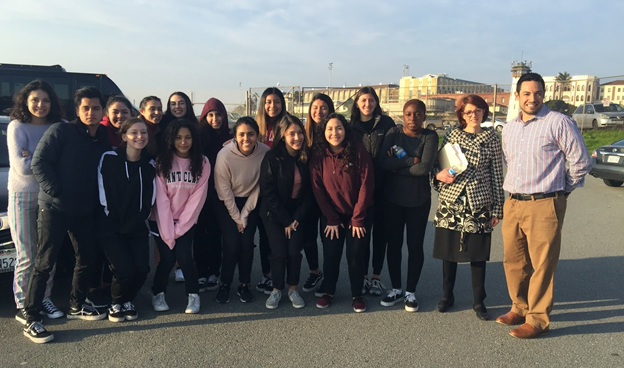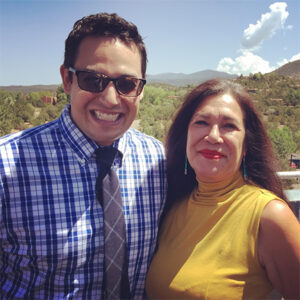This post was written by NCTE member Cruz Medina.
When the lockdowns started, I had to cancel a trip to San Quentin prison with some of my first-year college students.
In previous years, the students who attended the Shakespeare workshop with inmates felt transformed by the experience of reading and performing sections of The Merchant of Venice and other excerpts. In the bare portable building on the far side of the prison yard, the students saw the power of lyrical language to provoke insights as the men spoke about their own lives and life choices that contributed to them ending up in prison.
At the conclusion of the workshop, the men thanked us for spending our Sunday morning with them, saying the workshop helped them feel like they weren’t forgotten. During pandemic lockdowns, I have reflected on the connection lyrical language and poetry have to social justice through their power to humanize and to be forms of expression for incarcerated persons.

At this moment when the world feels imprisoned by the pandemic, poetry can provide new ways to think, to see, and to make sense of these tumultuous times. In “Coming into Language,” poet Jimmy Santiago Baca communicates his experience of becoming literate in prison. Baca explains that he gravitated toward poetry because it affected him differently; he writes, “I believe something in my brain or something in my nervous system was impacted by poetry, by the way the lines and the words were arranged” (qtd. in Baker 23).
While teaching poetry, sometimes focusing on appreciating the lyrical quality, tone, and structure have to be enough; however, culturally relevant poetry and writing like Baca’s can ring the bells of social justice with messages that echo the language and spark a pride in “culture that was previously unknown” (Medina 272).

I enjoy fearless Latinx writers like Ana Castillo because her experiences echo my own as Latinx. In her memoir, Black Dove, Castillo details how her son suffered from depression and got involved in an unarmed robbery.
Castillo explains, “Mi’jo had been depressed for a very long time and as I came to see it, had turned to drugs to self-medicate” (184). When her son was imprisoned, he began reading and writing more.
From a distance, Castillo encouraged her son’s writing: “He embraced the experimental prose-poetry style. . . . Mi’jo had become enthusiastic about literature, writing, and even acting” (192). Through our Zoom and Webex portals, we possess the potential to encourage students through our enthusiasm for the writing and literature that inspire us to feel more human.
Recently, I asked a class to read an article by Erec Toso about teaching poetry in an Arizona prison. Toso argues that incarcerated people are like Carl Jung’s idea of the shadow, the hidden parts of our consciousness that humans hide. He includes examples of incarcerated writers’ poetry that are full of original metaphor related to their parasitic dependency on drugs like heroin or inhumane relationships they’ve experienced with loved ones.
Toso says the writing works best when the unconscious shadow becomes visible and readers see incarcerated people as “the leftovers when opportunities ran dry” rather than as the monsters represented in popular media (20). Students in my class responded well to the poetry in Toso’s piece because they understood that the heavy feelings incarcerated writers describe could not be as accurately communicated in regular prose.
Poetry reconstructs the world though the syntax of verse, thereby communicating in a language of emotions that readers and writers feel as true, more so than the clickbait headlines to which we’ve become callous from doomscrolling. In virtual classrooms, mediated through screens, our quarantines similarly afford us moments to sit with poetry and reframe our missed connections with the outside world.
After all, better understanding the hardships we all currently face is and will continue to be an important part of not just the human experience, but also the process of returning to the normal experience of in-person interactions when social distancing is no longer necessary.
For more, listen to Cruz Medina’s interview with Ana Castillo for the This Rhetorical Life podcast: https://thisrhetoricallife.syr.edu/episode-33-cruz-medina-interviews-ana-castillo/
Further Readings
A Place to Stand by Jimmy Santiago Baca. (Open Road and Grove/Atlantic, 2007.)
“Coming into Language” in Working in the Dark: Reflections of a Poet of the Barrio, by Jimmy Santiago Baca (Red Crane Books, 1992, pp. 3–11.)
“Jimmy Santiago Baca: Poetry as Lifesaver” by Rob Baker in The Council Chronicle (March 2008)
Black Dove: Mamá, Mi’jo, and Me by Ana Castillo. (The Feminist Press at CUNY, 2016.)
“Teaching Jimmy Santiago Baca” by Cruz Medina, in Latino/a Literature in the Classroom: 21st Century Approaches to Teaching, edited by Frederick Aldama. (Routledge, 2015, pp. 271–74.)
“Lifting the Lid: How Prison Writing Workshops Shed Light on the Social Shadow,” by Erec Toso, in Community Literacy Journal (vol. 2, no. 2, 2016, pp. 19–26.)
 Cruz Medina is associate professor of rhetoric and composition in the department of English at Santa Clara University. Medina teaches writing for the first generation college student program (LEAD Scholars), a bilingual writing course, and courses on digital writing. His book Reclaiming Poch@ Pop: Examining the Rhetoric of Cultural Deficiency (Palgrave 2015) addresses issues of citizenship, education, and politics related to Latinxs in the US.
Cruz Medina is associate professor of rhetoric and composition in the department of English at Santa Clara University. Medina teaches writing for the first generation college student program (LEAD Scholars), a bilingual writing course, and courses on digital writing. His book Reclaiming Poch@ Pop: Examining the Rhetoric of Cultural Deficiency (Palgrave 2015) addresses issues of citizenship, education, and politics related to Latinxs in the US.
It is the policy of NCTE in all publications, including the Literacy & NCTE blog, to provide a forum for the open discussion of ideas concerning the content and the teaching of English and the language arts. Publicity accorded to any particular point of view does not imply endorsement by the Executive Committee, the Board of Directors, the staff, or the membership at large, except in announcements of policy, where such endorsement is clearly specified.

